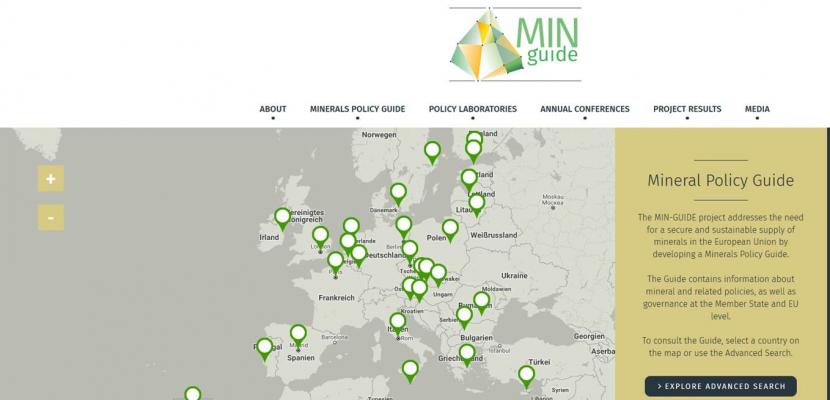Image

Min-Guide: Key innovations in exploration & extraction
Published on 31 January 2019

Afghanistan
This is the good practice's implementation level. It can be national, regional or local.
About this good practice
The Horizon 2020-funded MIN-GUIDE project aims to support the secure and sustainable supply of minerals in Europe through the development of a major new online repository outlining guidance and the latest in good practice. These insights form the basis for the project’s key output, an online Minerals Policy Guide. The work package “Innovative exploration and extraction” investigates how innovative exploration and extraction methods are taken up in different EU Member States and on EU level, and how this is supported or inhibited by national and European policy.
Through desktop research, stakeholder interviews and a questionnaire, an analysis of policy impact on innovations and a second round of interviews for the case studies chosen as the key innovations for exploration and extraction and the situation in EU countries, MIN-GUIDE was able to identify key innovations in exploration and extraction, as well as the relevant policy frames, thus providing guidance for stakeholders. Five examples for exploration and five for extraction are described as detailed case studies.
The main stakeholder groups to benefit from the work done in MINE-GUIDE are policy makers at all levels and from all across the EU dealing with mineral policy, as well as business and civil society organisations, who want to know about key innovation and related policies.
Through desktop research, stakeholder interviews and a questionnaire, an analysis of policy impact on innovations and a second round of interviews for the case studies chosen as the key innovations for exploration and extraction and the situation in EU countries, MIN-GUIDE was able to identify key innovations in exploration and extraction, as well as the relevant policy frames, thus providing guidance for stakeholders. Five examples for exploration and five for extraction are described as detailed case studies.
The main stakeholder groups to benefit from the work done in MINE-GUIDE are policy makers at all levels and from all across the EU dealing with mineral policy, as well as business and civil society organisations, who want to know about key innovation and related policies.
Resources needed
The financial or even human resources are hard to quantify as the innovations described are very different from each other, ranging from a few thousand Euros (e.g. explorations tools) to hundreds of millions (e.g. new mines using autonomous equipment).
Evidence of success
The innovations identified and described in MIN-GUIDE were described as the most important and key for mining in Europe by experts consulted in the project. It is mainly large companies that are already implementing these innovations (see case examples), thus piloting the way.
Potential for learning or transfer
In order for European mining (regions) to stay competitive internationally , it will need to be at the forefront of innovation, given that very often it competes with larger, less complex and easier to exploit mines globally.
The results from the MIN-GUIDE project provide examples and suggestions both for policy makers and exploration and mining companies on which innovations and related policies to focus on.
To give examples of policies currently being shaped with potential for learning and transfer and having an impact on innovation in exploration and extraction are aviation policies regulating the use of drones, data policies regulating data transparency, privacy and security and education and labour policies potentially impacting automation.
The results from the MIN-GUIDE project provide examples and suggestions both for policy makers and exploration and mining companies on which innovations and related policies to focus on.
To give examples of policies currently being shaped with potential for learning and transfer and having an impact on innovation in exploration and extraction are aviation policies regulating the use of drones, data policies regulating data transparency, privacy and security and education and labour policies potentially impacting automation.
Further information
Website
Good practice owner
Organisation
European Commission

Afghanistan
Contact